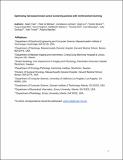Optimizing risk-based breast cancer screening policies with reinforcement learning
Author(s)
Yala, Adam; Mikhael, Peter G; Lehman, Constance; Lin, Gigin; Strand, Fredrik; Wan, Yung-Liang; Hughes, Kevin; Satuluru, Siddharth; Kim, Thomas; Banerjee, Imon; Gichoya, Judy; Trivedi, Hari; Barzilay, Regina; ... Show more Show less
DownloadAccepted version (3.488Mb)
Open Access Policy
Open Access Policy
Creative Commons Attribution-Noncommercial-Share Alike
Terms of use
Metadata
Show full item recordAbstract
Screening programs must balance the benefit of early detection with the cost of overscreening. Here, we introduce a novel reinforcement learning-based framework for personalized screening, Tempo, and demonstrate its efficacy in the context of breast cancer. We trained our risk-based screening policies on a large screening mammography dataset from Massachusetts General Hospital (MGH; USA) and validated this dataset in held-out patients from MGH and external datasets from Emory University (Emory; USA), Karolinska Institute (Karolinska; Sweden) and Chang Gung Memorial Hospital (CGMH; Taiwan). Across all test sets, we find that the Tempo policy combined with an image-based artificial intelligence (AI) risk model is significantly more efficient than current regimens used in clinical practice in terms of simulated early detection per screen frequency. Moreover, we show that the same Tempo policy can be easily adapted to a wide range of possible screening preferences, allowing clinicians to select their desired trade-off between early detection and screening costs without training new policies. Finally, we demonstrate that Tempo policies based on AI-based risk models outperform Tempo policies based on less accurate clinical risk models. Altogether, our results show that pairing AI-based risk models with agile AI-designed screening policies has the potential to improve screening programs by advancing early detection while reducing overscreening.
Date issued
2022-01Department
Massachusetts Institute of Technology. Department of Electrical Engineering and Computer ScienceJournal
Nature Medicine
Publisher
Springer Science and Business Media LLC
Citation
Yala, Adam, Mikhael, Peter G, Lehman, Constance, Lin, Gigin, Strand, Fredrik et al. 2022. "Optimizing risk-based breast cancer screening policies with reinforcement learning." Nature Medicine, 28 (1).
Version: Author's final manuscript